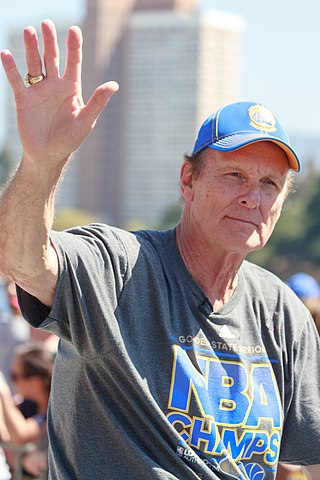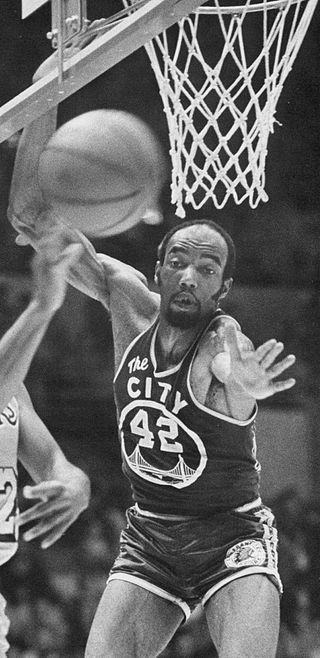NBA career
In Los Angeles, King played much of his first three seasons behind former UCLA teammates Gail Goodrich and Walt Hazzard, after which the Lakers left him unprotected in the expansion draft. No sooner were he and Jeff Mullins claimed by Chicago on May 1, 1966, than they were traded to San Francisco in return for All-Star guard Guy Rodgers. The move proved to be a fortuitous one for both players, as they were instrumental in the Warriors' drive to the 1966–67 Western Division title. On April 18, 1967, King (28 points) and superstar teammate Rick Barry (55) combined for 83 points in Game 3 of the NBA Finals, a 130–124 victory over the Philadelphia 76ers. Only the Lakers tandem of Elgin Baylor (61) and Jerry West (26) had scored more in a championship series game.
King was even better in the 1967–68 season, when he emerged as one of the best combo guards in the league. Despite the absence of Barry, who had jumped to the rival ABA in the off-season, the Warriors picked up where they left off, only this time with King in a lead role. In his first 15 games, he ranked among the NBA scoring leaders at 24.2 points per game. He also averaged 4.9 assists and 4.7 rebounds in that span. King suffered a knee injury which a short time later would reduce his effectiveness. Nonetheless, he was selected to play with the West team in the 1968 All-Star Game in New York. In a 144–124 loss, he had four points and two assists off the bench.
Prior to the 1969–70 campaign, King and Bill Turner were traded to the Cincinnati Royals in return for Jerry Lucas. But, King saw action in only 31 games because of knee problems. He signed with Chicago one year later and played his final three seasons off the bench there.

Richard Francis Dennis Barry III is an American retired professional basketball player who starred at the NCAA, American Basketball Association (ABA) and National Basketball Association (NBA) levels. Barry ranks among the most prolific scorers and all-around players in basketball history. He is the only player to lead the National Collegiate Athletic Association (NCAA), ABA, and NBA in points per game in a season. He ranks as the all-time ABA scoring leader in regular season and postseason (33.5) play, while his 36.3 points per game are the most in NBA Finals history.

Nathaniel Thurmond was an American basketball player who spent the majority of his 14-year career in the National Basketball Association (NBA) with the Golden State Warriors franchise. He played the center and power forward positions. Thurmond was a seven-time All-Star and the first player in NBA history to record an official quadruple-double. In 1965, he grabbed 42 rebounds in a game; only Wilt Chamberlain and Bill Russell recorded more rebounds in an NBA game. Thurmond was named a member of the Naismith Memorial Basketball Hall of Fame in 1985, one of the 50 Greatest Players in NBA History, and part of the NBA 75th Anniversary Team in 2021.

Jerry Alan West was an American basketball player and executive. He played professionally for the Los Angeles Lakers of the National Basketball Association (NBA), and is widely regarded as one of the greatest players of all time. His nicknames included "the Logo", in reference to his silhouette being the basis for the NBA logo; "Mr. Clutch", for his ability to make a big play in a key situation such as his famous buzzer-beating 60-foot shot that tied Game 3 of the 1970 NBA Finals against the New York Knicks; "Mr. Outside", in reference to his perimeter play with the Lakers and "Zeke from Cabin Creek" for the creek near his birthplace of Chelyan, West Virginia.

Jerry Darnell Stackhouse is an American basketball coach and former professional player who is the assistant coach of the Golden State Warriors of the National Basketball Association. Stackhouse played college basketball for the North Carolina Tar Heels and played 18 seasons in the National Basketball Association (NBA) and was a two-time NBA All-Star. He was the head coach of Raptors 905 and an assistant coach for the Toronto Raptors and Memphis Grizzlies. Additionally, he has worked as an NBA TV analyst.

Shaun Patrick Livingston is an American professional basketball executive and former player. He entered the league directly out of high school and was selected fourth by the Los Angeles Clippers in the 2004 NBA draft. During his 15-year career, Livingston played 959 games for nine teams and won three NBA championships as a member of the Golden State Warriors—in 2015, 2017 and 2018.

Gail Charles Goodrich Jr. is an American former professional basketball player in the National Basketball Association (NBA). He is best known for scoring a then record 42 points for UCLA in the 1965 NCAA championship game vs. Michigan, and his part in the Los Angeles Lakers' 1971–72 season. During that season the team won a still-record 33 consecutive games, posted what was at the time the best regular season record in NBA history, and also won the franchise's first NBA championship since relocating to Los Angeles. Goodrich was the leading scorer on that team. He is also acclaimed for leading UCLA to its first two national championships under the legendary coach John Wooden, the first in 1963–64 being a perfect 30–0 season when he played with teammate Walt Hazzard. In 1996, 17 years after his retirement from professional basketball, Goodrich was elected to the Naismith Memorial Basketball Hall of Fame. Goodrich is the leader in most minutes played in Suns franchise history with 39.9.

Antawn Cortez Jamison is an American former professional basketball player who played 16 seasons in the National Basketball Association (NBA). He serves as director of pro personnel for the Washington Wizards. Jamison played college basketball for the North Carolina Tar Heels, being named national player of the year in 1998.

Rodney King Thorn is an American basketball executive and a former professional player and coach, Olympic Committee Chairman, with a career spanning over 50 years. In 2018, Thorn was inducted into the Naismith Memorial Basketball Hall of Fame.

The 1974–75 NBA season was the 29th season of the National Basketball Association. The season ended with the Golden State Warriors winning the NBA Championship, sweeping the Washington Bullets 4 games to 0 in the NBA Finals.
The 1968–69 NBA season was the 23rd season of the National Basketball Association. The season ended with the Boston Celtics winning the NBA Championship, beating the Los Angeles Lakers 4 games to 3 in the NBA Finals.
The 1966–67 NBA season was the 21st season of the National Basketball Association. The season ended with the Philadelphia 76ers winning the NBA Championship, beating the San Francisco Warriors 4 games to 2 in the NBA Finals, ending the Boston Celtics' record title run at 8.
The 1965–66 NBA season was the 20th season of the National Basketball Association. The season ended with the Boston Celtics winning an unprecedented 8th straight NBA Championship, beating the Los Angeles Lakers 4 games to 3 in the 1966 NBA Finals.
The 1963–64 NBA season was the 18th season of the National Basketball Association. The season ended with the Boston Celtics winning their 6th straight NBA Championship, beating the San Francisco Warriors 4 games to 1 in the NBA Finals.
The 1962–63 NBA season was the 17th season of the National Basketball Association. The season ended with the Boston Celtics winning their 5th straight NBA Championship, beating the Los Angeles Lakers 4 games to 2 in the NBA Finals.

John Levell Starks is an American former professional basketball player who was a shooting guard in the National Basketball Association (NBA). He was undrafted in the 1988 NBA draft after attending four colleges in his native Oklahoma, including Oklahoma State University. Starks was named an NBA All-Star while playing for the New York Knicks in the 1990s.
During the 1971–72 season the Los Angeles Lakers won their first National Basketball Association (NBA) title since moving to Los Angeles. The Lakers defeated the New York Knicks in five games to win the title, after going 69–13 during the regular-season, a record that stood for 24 seasons until the 1995–96 Chicago Bulls went 72–10. During the regular season, they would also go on an NBA record 33-game winning streak. The team went on to win 81 regular season and playoff games overall, a record that would stand alone for 14 years until the Boston Celtics matched it in 1986. Widely regarded as one of the greatest basketball teams of all time, the 1971–72 Lakers were named as one of the Top 10 Teams in NBA History in 1996.
The history of the Golden State Warriors began in Philadelphia in 1946. In 1962, the franchise was relocated to San Francisco, California and became known as the San Francisco Warriors until 1971, when its name was changed to the current Golden State Warriors. Along with their inaugural championship win in the 1946–47 season, the Warriors have won six others in the team's history, including another in Philadelphia after the 1955–56 season, and five more as Golden State after the 1974–75, 2014–15, 2016–17, 2017–18 and 2021–22 seasons.
The 2000–01 New Jersey Nets season was the Nets' 34th season in the National Basketball Association, and 25th season in East Rutherford, New Jersey. The Nets won the Draft Lottery and selected Kenyon Martin from the University of Cincinnati with the first overall pick in the 2000 NBA draft, and signed free agents Aaron Williams, and rookie guard Stephen Jackson during the off-season. Under new head coach, retired Los Angeles Lakers guard Byron Scott, the Nets got off to a 6–4 start, but then lost nine consecutive games while losing 17 of their next 20 games. Keith Van Horn only played just 49 games due to a leg injury, and Kendall Gill only played just 31 games due to tendinitis in his right knee, while Kerry Kittles missed the entire season with a knee injury. The Nets lost their final six games finishing sixth in the Atlantic Division with a 26–56 record.
The 1994–95 NBA season was the Warriors’ 49th season in the National Basketball Association, and 33rd in the San Francisco Bay Area. During the off-season, the Warriors acquired Ricky Pierce and top draft pick Carlos Rogers from the Seattle SuperSonics. After having finished 50–32 the previous season, the Warriors made a number of deals to toughen the team in the middle by trading Billy Owens to the Miami Heat in exchange for Rony Seikaly. Before the season even started, second-year star Chris Webber began the season by exercising his option to become a restricted free agent, claiming irreconcilable differences with head coach Don Nelson. He asked to be traded, and the Warriors obliged, sending him to the Washington Bullets in exchange for Tom Gugliotta, who would later on be traded to the Minnesota Timberwolves in exchange for top draft pick Donyell Marshall midway through the season.
The 1966–67 NBA season was the Warriors' 21st in the NBA, fifth in the San Francisco Bay Area and among the most wildly successful in franchise history. They entered the season on the heels of a 35–45 record that barely failed to make the postseason cut. Led by All-Stars Rick Barry and Nate Thurmond, they surprised the basketball world with a Western Division title on the strength of a 44-37 record. They advanced to the NBA Finals, losing to the heavily favored Philadelphia 76ers in six games.









